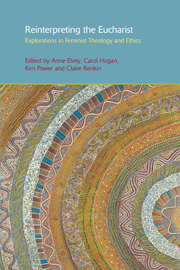Book contents
- Frontmatter
- Contents
- List of Illustrations
- Foreword
- Acknowledgements
- Contributors
- 1 Introduction
- 2 Eucharistic Metamorphosis: Changing Symbol, Changing Lives
- 3 The Sunday Eucharist: Embodying Christ in a Prophetic Act
- 4 How Australian Aboriginal Christian Womanist Tiddas (Sisters) Theologians Celebrate the Eucharist
- 5 Women, Eucharist, and Good News to All Creation in Mark
- 6 Rediscovering Forgotten Features: Scripture, Tradition and Whose Feet May Be Washed on Holy Thursday Night
- 7 Mystery Appropriated: Disembodied Eucharist and Meta-theology
- 8 Real Presence: Seeing, Touching, Tasting: Visualizing the Eucharist in Late Medieval Art
- 9 Embodying the Eucharist
- 10 Living One for the Other: Eucharistic Hospitality as Ecological Hospitality
- Subject Index
- Name Index
7 - Mystery Appropriated: Disembodied Eucharist and Meta-theology
- Frontmatter
- Contents
- List of Illustrations
- Foreword
- Acknowledgements
- Contributors
- 1 Introduction
- 2 Eucharistic Metamorphosis: Changing Symbol, Changing Lives
- 3 The Sunday Eucharist: Embodying Christ in a Prophetic Act
- 4 How Australian Aboriginal Christian Womanist Tiddas (Sisters) Theologians Celebrate the Eucharist
- 5 Women, Eucharist, and Good News to All Creation in Mark
- 6 Rediscovering Forgotten Features: Scripture, Tradition and Whose Feet May Be Washed on Holy Thursday Night
- 7 Mystery Appropriated: Disembodied Eucharist and Meta-theology
- 8 Real Presence: Seeing, Touching, Tasting: Visualizing the Eucharist in Late Medieval Art
- 9 Embodying the Eucharist
- 10 Living One for the Other: Eucharistic Hospitality as Ecological Hospitality
- Subject Index
- Name Index
Summary
And because that Christ, our Redeemer, declared that which He offered under the species of bread to be truly His own body, therefore has it ever been a firm belief in the Church of God, and this holy Synod doth now declare it anew, that, by the consecration of the bread and of the wine, a conversion is made of the whole substance of the bread into the substance of the body of Christ our Lord, and of the whole substance of the wine into the substance of His blood; which conversion is, by the holy Catholic Church, suitably and properly called Transubstantiation
(Council of Trent 1545–1563).In this essay, I explore Catherine Pickstock's reading of the eucharistic words of Consecration, a reading that invokes Plato's view that ‘language exists primarily, and in the end only has meaning as, the praise of the divine’. Immediately, we need to be aware that Pickstock is articulating a relational theology, where community, the divine, language, symbolic practice and action are inter-related and interpenetrate. However, I argue that her account too literally interprets the alleged words of Jesus which traditionally have been construed as the very institution of the Eucharist, and that this is contrary to a relational theology based in ethics. Pickstock shares with Louis-Marie Chauvet a commitment to the importance of the socio-ethical context of Christian life. Whereas Chauvet situates Christian community within language and culture, however, Pickstock traces the emergence of civil society and secularity from the religious world of the Middle Ages. As I read her, Pickstock seems to hold the view that the theological is the semantic ground of the social.
- Type
- Chapter
- Information
- Reinterpreting the EucharistExplorations in Feminist Theology and Ethics, pp. 113 - 129Publisher: Acumen PublishingPrint publication year: 2012

